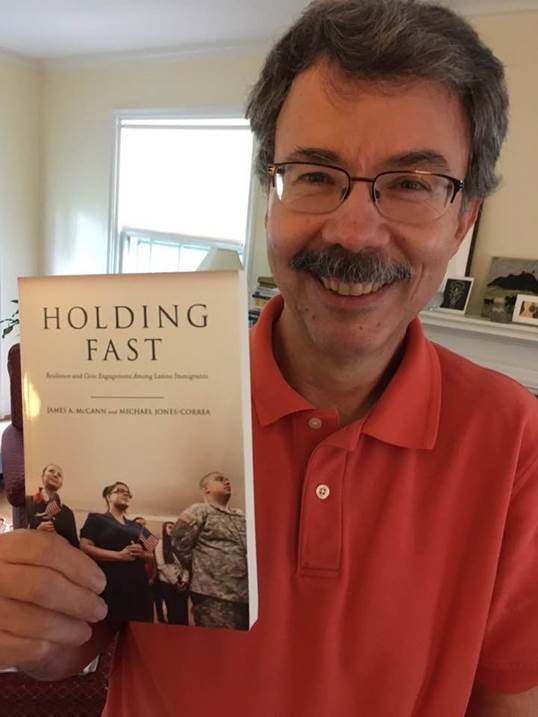Resilience of Democracy
James McCann: Recent Research

With one book recently published by the Russell Sage Foundation, Professor James McCann will see another book published in 2021 by Cambridge University Press. The first book, Holding Fast: Resilience and Civic Engagement among Latino Immigrants, was coauthored with Michael Jones-Correa of the University of Pennsylvania. The second, Republic at Risk, allowed McCann to extend an important intellectual relationship with Walter J. Stone, his former dissertation chair and a long-time collaborator.
Holding Fast considers how immigrants reacted to the 2016 election. In the wake of Donald Trump’s campaign victory, many commentators predicted that immigrants, notably Latino immigrants, would become fearful and disillusioned with life in the United States in response to anti-immigrant rhetoric and policies.
Drawing from an original panel survey administered at three points in time -- the summer of 2016, immediately following the 2016 election, and during the summer of 2017 -- McCann and Jones-Correa discovered that Latino immigrants were indeed quite apprehensive about the political climate. This was not the whole story, however.
The survey indicated that Latino immigrants were also angry and deeply concerned about the direction the country had taken. These attitudes led to a loss of faith in American governing institutions under the new administration. However, immigrants did not lose faith in America on the whole; nor did immigrants become more inclined to return to their country of origin after the election. Most importantly, the anxiety, anger, and disappointment that immigrants felt did not lead to a withdrawal from civic life. Just the opposite occurred – immigrants became more engaged in politics. These findings bode well for the ongoing incorporation of immigrants into American democracy, even in turbulent times.
James Madison’s writings in Federalist Nos. 10 and 51 are at the heart of McCann’s forthcoming book, Republic at Risk. This work with Stone considers the interplay between citizens pursuing their own “self-interest” in politics and the actions of policymakers in response to the demands placed upon them. Madison believed that conflicts among “factions” (that is, self-interested groups) could, if left to run their course, undermine a free society. For this reason, our complex system of checking and balancing powers across governing institutions was created. But in practice, how well is this system holding up? Republic at Risk critically examines when pressures from “self-interested” individuals and groups lead to representation, and when they may not.
Of the thousands of words penned by McCann and his collaborators, one word in particular connects the two books. That word is “resilience.”
Used to describe the response of Latino immigrants to the Trump campaign and the policies of the Trump presidency, the idea of resilience runs through his work with Stone -- in this case, the “resilience of democracy” in the face of growing political polarization, divided government, and inequality.
Professor McCann came to Purdue in 1991. He has held visiting appointments at the Brookings Institution, the Russell Sage Foundation, and the Institute for Policy Research at the Catholic University of America. In the fall of 2021, he will hold the Fulbright Canada Research Chair in North American Politics at Carlton University in Ottawa. His research interests include public opinion and political psychology, campaigns and elections, political parties, immigrant incorporation, and survey design and methodology. In addition to his work in political science, Professor McCann is co-coordinator of the Advanced Methods at Purdue (AMAP) initiative to enhance methodological training and promote research collaborations in the behavioral, health, and social sciences.